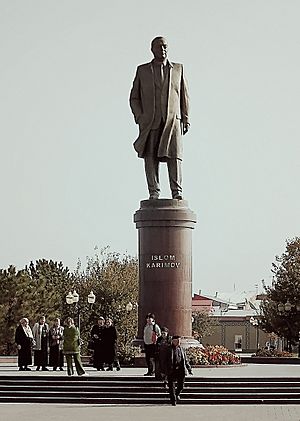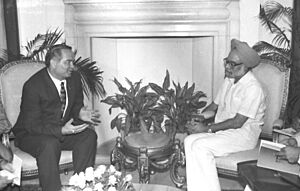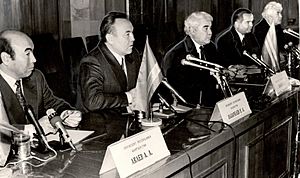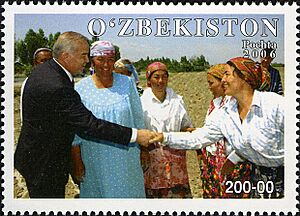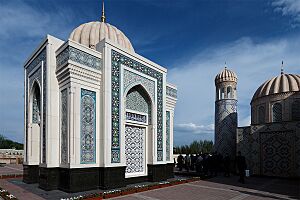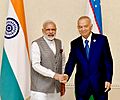Islam Karimov facts for kids
Quick facts for kids
Yurtboshi
Hero of Uzbekistan Islam Karimov
|
|
|---|---|
| Ислом Каримов Islom Karimov |
|
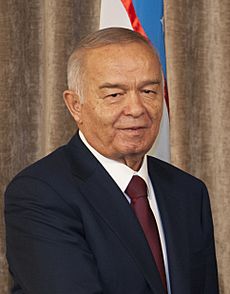
Karimov in 2013
|
|
| 1st President of Uzbekistan | |
| In office 1 September 1991 – 2 September 2016 |
|
| Prime Minister | Abdulhashim Mutalov (1992–1995) Oʻtkir Sultonov (1995–2003) Shavkat Mirziyoyev (2003–2016) |
| Vice President | Shukrullo Mirsaidov (1990–1992) |
| Preceded by | Office established |
| Succeeded by | Nigmatilla Yuldashev (Acting) Shavkat Mirziyoyev |
| President of the Uzbek Soviet Socialist Republic | |
| In office 24 March 1990 – 1 September 1991 |
|
| Preceded by | Office established |
| Succeeded by | Office abolished |
| First Secretary of the Communist Party of Uzbekistan | |
| In office 23 June 1989 – 1 September 1991 |
|
| Preceded by | Rafiq Nishonov (1988–1989) |
| Succeeded by | Office abolished |
| Personal details | |
| Born |
Islom Abdugʻaniyevich Karimov
30 January 1938 Samarkand, Uzbek SSR, Soviet Union (now Uzbekistan) |
| Died | 2 September 2016 (aged 78) Tashkent, Uzbekistan |
| Political party | Communist Party of Uzbekistan (Before 1991) People's Democratic Party (1991–2006) Liberal Democratic Party (2006–2016) |
| Spouses | Natalya Kuchmi (m. 1964; div. circa 1966) Tatyana Karimova (m. 1967; 2016; his death) |
| Children |
|
Islam Abduganiyevich Karimov (Uzbek: Islom Abdugʻaniyevich Karimov / Ислом Абдуғаниевич Каримов; Russian: Ислам Абдуганиевич Каримов; 30 January 1938 – 2 September 2016) was a major leader in Uzbekistan. He led the country and its earlier state, the Uzbek Soviet Socialist Republic, from 1989 until he passed away in 2016. He was the last First Secretary of the Communist Party of Uzbekistan from 1989 to 1991. After that, the party changed its name to the People's Democratic Party of Uzbekistan (PDP), and he led it until 1996.
Karimov was the President of the Uzbek SSR from March 24, 1990. He then declared Uzbekistan an independent nation on September 1, 1991. He was elected president in December 1991. He was re-elected several times in 2000, 2007, and 2015. He passed away from a stroke on September 2, 2016. He had been the president of Uzbekistan for 25 years.
Contents
About Islam Karimov
Early Life and Career Path
Islam Karimov was born in Samarkand on January 30, 1938. His parents were civil servants from Uzbekistan. He spent some time in an orphanage as a child. He finished high school in 1955.
In 1960, he earned a degree in mechanical engineering. He then started working as an engineer. Later, he got a master's degree in economics in 1967. From 1966 to 1986, he worked his way up in the Uzbek State Planning Committee. He became the Minister of Finance of the Uzbek SSR.
In 1986, Karimov became the first secretary of the Communist Party in the Qashqadaryo Region. In 1989, he became the first secretary of the Communist Party of the Uzbek SSR. This happened after his predecessor could not calm down ethnic clashes in the Fergana Region. From 1990 to 1991, he was a member of important committees in the Soviet Union. On March 24, 1990, he was chosen as the first President of the Republic by the Uzbek Supreme Soviet.
On August 31, 1991, Karimov announced that Uzbekistan was an independent republic. This was 10 days after an attempted coup in Moscow. September 1 was then made Uzbekistan's Independence Day. The Uzbek Communist Party changed its name to the People's Democratic Party of Uzbekistan (PDP). In the December 1991 presidential election, Karimov won with 86% of the votes.
Leading Uzbekistan as President
Under Karimov's leadership, Uzbekistan was known as a strong state. He worked to prevent other political leaders from gaining power. In 1992, he completed the hajj, which is a pilgrimage to Mecca.
Government Policies
Karimov did not travel much to other countries, especially to Western nations. In 2016, there were only 44 foreign embassies in Tashkent. Only seven of these were from Western countries.
Under Karimov, there were strict rules for non-governmental organizations (NGOs). Many of these groups were actually created by the government. Trade unions became tools for management. They were not used for workers to bargain for their interests. Universities were also expected to focus only on teaching. They were not meant to be places for discussing public issues.
Views on Religion
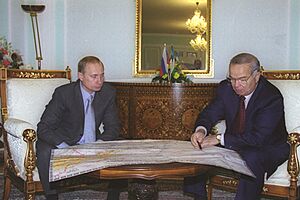
After Uzbekistan became independent, Karimov used some Islamic symbols. This was to gain support from religious groups. However, in May 1999, new rules were made for religious groups. For example, building mosques needed special permission. An attempt to harm Karimov in 1999 led to even stricter rules for Islamic groups.
After the September 11 attacks in 2001, Uzbekistan became an ally of the United States. This was part of the "War on Terror" because both opposed the Taliban. Uzbekistan allowed the U.S. to use the Karshi-Khanabad base. This base helped U.S. efforts in the 2001 invasion of Afghanistan. However, U.S.-Uzbek relations became difficult in May 2005. This happened when Karimov's government asked the U.S. to leave the base. This was after the U.S. criticized the government's actions during protests in Andijan. In July 2005, U.S. military forces left the base.
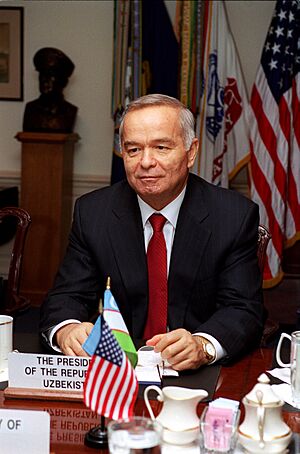
Karimov took action against groups like the Islamic Movement of Uzbekistan (IMU) and Hizb ut-Tahrir. His government called these groups terrorist organizations. The Uzbek government sentenced the leaders of the IMU to death even though they were not present. From 1991 to 2004, the government put many Uzbeks in prison. They were accused of "Islamist extremism." In 2005, Karimov banned the Muslim call to prayer from being broadcast. This ban was lifted in November 2017 by the next president, Shavkat Mirziyoyev.
Re-elections
Karimov ran for president again in December 2007. Some people argued that he could not run because of a rule about serving only two terms. On November 6, 2007, Karimov accepted the nomination from the Uzbekistan Liberal Democratic Party. The Central Election Commission approved his candidacy on November 19.
After the election on December 23, 2007, official results showed Karimov won with 88.1% of the votes. Groups allied with Karimov's government said the election was fair. However, other observers criticized the election. They said it did not offer a "genuine choice."
Karimov was re-elected for another term in the 2015 presidential election. He won 90.39% of the votes. This was his third term under Uzbekistan's current constitution. Western media and observers criticized this election. They said it was unfair. However, monitoring groups from former Soviet countries and China said the election was open and democratic.
Foreign Relations
Karimov's foreign policy was often about keeping Uzbekistan separate from other countries. Big powers wanted to work with him because of Uzbekistan's gas supplies. But he kept everyone at a distance. He was careful about Russia's goals and the U.S. idea of "democratization." In 1999, he said that the Organization for Security and Co-operation in Europe (OSCE) focused too much on human rights. He thought they should focus more on security issues in Central Asia.
Personal Life
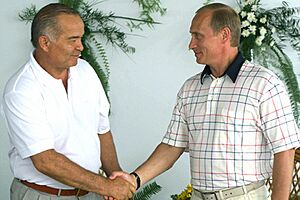
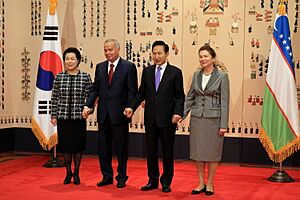
Islam Karimov married his first wife, Natalya Petrovna Kuchmi, in 1964. They had a son named Petr before they divorced.
Karimov's second wife was Tatyana Akbarovna Karimova. They married in 1967. She is an economist. They had two daughters and five grandchildren.
His elder daughter, Gulnara Karimova, is a diplomat and businesswoman. She started foundations that focus on culture and social life in Uzbekistan.
Karimov's second daughter, Lola Karimova-Tillyaeva, is known for promoting education and sports in Uzbekistan. She also supports the rights of children. She founded charity organizations that help orphans and children with disabilities.
Karimov and his second wife had five grandchildren: Islam Karimova Jr., Iman Karimova, Mariam Tillyaeva, Umar Tillyaev, and Safiya Tillyaeva.
Illness and Passing
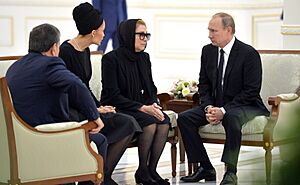
Islam Karimov's health was not often discussed by government officials. On August 27, 2016, he was taken to the hospital. He had suffered a stroke. His daughter Lola Karimova-Tillyaeva said he was in stable condition.
On September 2, 2016, it was announced that Karimov was in a "critical condition." A few hours later, news agencies reported that he had passed away. The Prime Minister of Turkey was the first official to confirm his death. According to the government report, Karimov passed away at 8:55 PM local time on September 2, 2016.
Funeral and Tributes
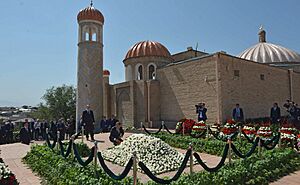
After Karimov's passing, Prime Minister Shavkat Mirziyoyev was chosen to lead the funeral arrangements. Many world leaders, including presidents from the United States, China, Russia, and India, sent their condolences. Uzbekistan declared three days of mourning.
On September 3, thousands of people in Tashkent lined the streets for Karimov's funeral procession. They threw flowers as his coffin was taken to the airport. He was flown to his hometown of Samarkand for burial. His funeral service was held at Registan Square. Delegations from 17 foreign countries attended the ceremony. These included presidents from Tajikistan, Turkmenistan, and Afghanistan. The prime ministers of Russia, Kazakhstan, and Georgia were also there.
On September 6, Russian President Vladimir Putin visited Samarkand to pay his respects. He laid red roses at Karimov's grave. Putin also met with Karimov's family to offer his condolences. Other leaders, like Kazakh President Nursultan Nazarbayev and Belarusian President Alexander Lukashenko, also visited the grave. Many other high-ranking officials from various countries paid tribute to Karimov. On November 1, a square in Moscow was named after Islam Karimov.
Awards
From the USSR
| Order of the Red Banner of Labour | |
| Order of Friendship of Peoples |
From Uzbekistan
| Hero of Uzbekistan | |
| Order of Independence | |
| Order of Amir Temur |
From Other Countries
| Order of the Balkan Mountains (Bulgaria) | |
| Order of the Golden Fleece (Georgia) | |
| Presidential Order of Excellence (Georgia, 2013) | |
| Order of Merit of the Italian Republic (Italy, 1997) | |
| Order of the Golden Eagle (Kazakhstan) | |
| Golden Order in honor of the 1000th anniversary of Manas (Kyrgyzstan, 1995) | |
| Order of the Three Stars (Latvia, 2008) | |
| Cross of Recognition (Latvia) | |
| Grand Cross of the Order of Vytautas the Great, 1st class (Lithuania) | |
| Grand Cross of the Order of Merit of the Republic of Poland (Poland) | |
| Order of the Republic of Serbia, 2nd class | |
| Order of the Golden Fleece (Spain) | |
| Sash of Collar of Order of Civil Merit (Spain) | |
| Grand Order of Mugunghwa (South Korea) | |
| Order of Prince Yaroslav the Wise, 2nd degree (Ukraine) | |
| Order of Merit (Ukraine) | |
| Olympic Order (International Olympic Committee) | |
| Order of Merit (AIBA, 2016) |
Images for kids
-
U.S. Secretary of State John Kerry shakes hands with President Karimov in Samarkand, on November 1, 2015.
-
Indian Prime Minister Narendra Modi with Karimov in Tashkent, 2016
-
Karimov and Dmitry Medvedev at a CIS Summit in 2008
-
Lee Myung-bak Karimov held a Korea-Uzbekistan Summit in Seoul, February 2010
See also
 In Spanish: Islom Karimov para niños
In Spanish: Islom Karimov para niños
 | Jackie Robinson |
 | Jack Johnson |
 | Althea Gibson |
 | Arthur Ashe |
 | Muhammad Ali |


